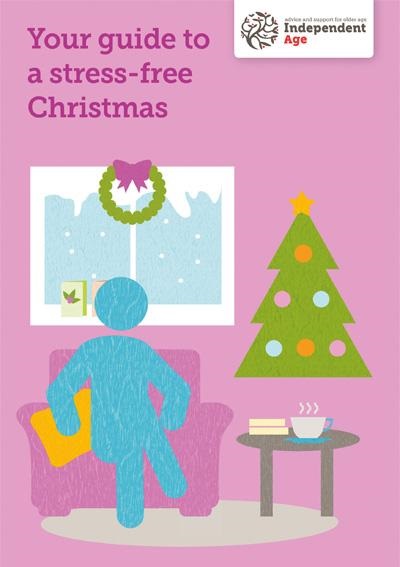Christmas is less than a month away and while it should be a happy and festive time, it can also be a stressful one, bringing extra pressures and worries for some older people.
To help combat this, leading UK charity Independent Age has put together a helpful and free 28-page guide to help you plan for a stress-free Christmas. It has tips on making this time less trying, including budgeting advice, what to do if you’re worried about feeling lonely, how to plan for family visits and what to consider if you’re celebrating with someone living with dementia.
 As with most of the advice guides in Independent Age’s wide range, this one has been compiled using shared experiences, tips and quotes from people who have faced the challenges outlined. It is written in a straightforward, easy-to-understand way and available to download in various formats or to order by phone (see details at end of this blog).
As with most of the advice guides in Independent Age’s wide range, this one has been compiled using shared experiences, tips and quotes from people who have faced the challenges outlined. It is written in a straightforward, easy-to-understand way and available to download in various formats or to order by phone (see details at end of this blog).
The first section is on budgeting, which many people find a growing challenge as Christmas becomes increasingly commercialised. There is advice on planning ahead, being realistic about what you can afford and limiting the expectation of others. As one of the contributors puts it: “If money’s tight, limit gifts to close family and friends. Don’t feel obliged to buy for people you don’t talk to regularly.”
The guide also has a pull-out template list to help you budget for things like food, decorations, presents, cards and postage. You can also access an online Christmas calculator on the Independent Age website. It’s all too easy to get carried away and end up spending more than you intended or can afford, but by planning ahead you can avoid starting the new year burdened by Christmas debt.
The next section covers loneliness, which can be felt acutely by some older people at Christmas, especially those who live alone or are socially isolated. While acknowledging that some people enjoy their own company, the guide is also packed with tips for those who would like to socialise more, keep in touch with family who live further away, or would just like someone to talk to when loneliness gets them down.
The first Christmas following the death of a loved one can be particularly tough and again the guide has useful information and contacts. It also encourages others to think about family, friends and neighbours who might be lonely and how they could help. As one contributor points out: “People can be quite good at checking whether acquaintances will be alone on Christmas Day, but forget to look out for each other over the longer festive period and at New Year. The run up to Christmas can be worse for some people.”
The next section looks at various ways to stay in touch with family and friends, especially those who live some distance away. It includes advice on new technology and where to find tailored free advice on how to use it. With a little coaching on how to use features of a computer or smartphone, you could be watching family members in another country open their presents on Christmas morning. Many people are daunted by technology, but it’s designed to be simple once you know a few basics.
Celebrating Christmas with someone who has dementia can bring extra challenges, but the guide helps you adjust your expectations and plan accordingly. If you live with a dementia sufferer full-time, there’s probably nothing new here, but the guide is packed with helpful common sense advice for anyone who isn’t used to coping with the condition. One of many tips is: “Check the TV listing for a favourite classic film you might enjoy. My granny couldn’t remember our names one Christmas but still knew all the words to The Sound of Music.”
The final section of the guide looks at Christmas and care homes – either visiting a friend or relative in their care home to help them celebrate, or making practical arrangements for them to visit or stay with you. It has helpful advice on the things you’ll need to consider.
You can download the Guide to a Stress-Free Christmas direct from the Independent Age website by clicking here, then either read it on screen or print it off for easy reference. You can also listen to an audio version of the guide on the same website page, or request a paper copy by calling the free helpline on 0800 319 6789. Independent Age had produced an extensive range of free advice guides, factsheets and leaflets on issues affecting older people, which you can browse by clicking here.
